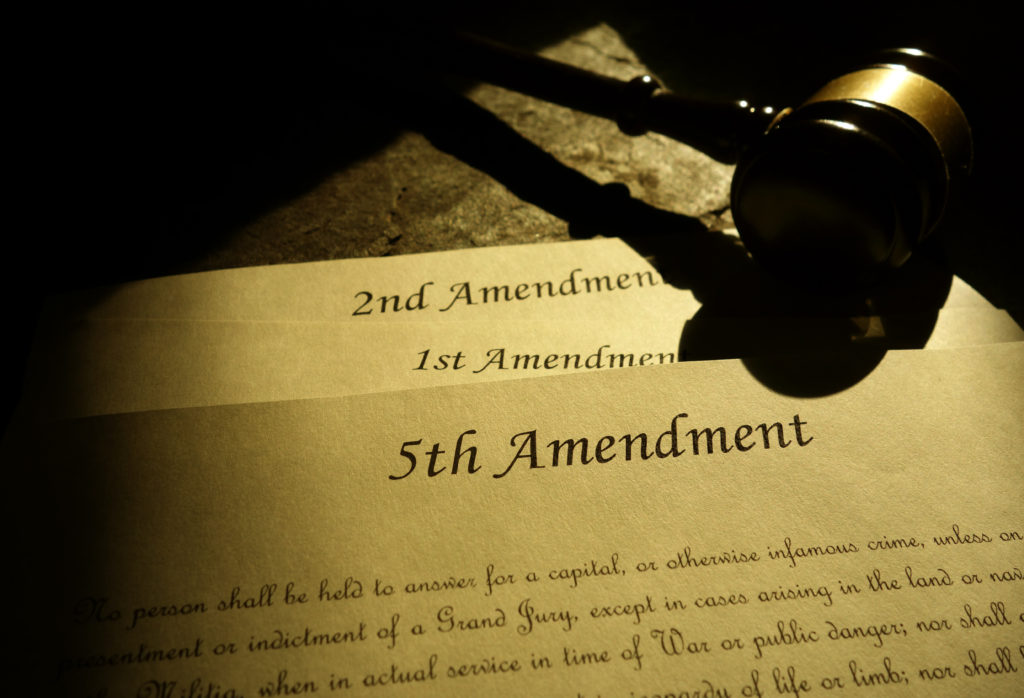Kristi Schubert recently published this article in the Louisiana Association for Justice publication, “Louisiana Advocates.”
Who can invoke the Fifth Amendment?
Any individual, whether or not they are a party to the proceedings at bar, may invoke the privilege against self-incrimination. Kastigar v. United States, 406 U.S. 441, 444 (1972).
When can the Fifth Amendment be invoked?
The Fifth Amendment can be invoked whenever an individual has a reasonable fear that providing truthful testimony might incriminate him in a future criminal proceeding. Kastigar v. United States, 406 U.S. 441, 444 (1972). The fear may be “remote,” but is must be more than a “fanciful” fear. In re Corrugated Container Antitrust Litig., 620 F.2d 1086, 1091 (5th Cir. 1980) (quoting In re Folding Carton Antitrust Litig., 609 F.2d 867, 871 (7th Cir. 1979)).
How will the court evaluate whether the invocation of the Fifth Amendment is justified?
When an individual invokes the Fifth Amendment, it is up to the court to determine whether the privilege is justified given the situation. The court will look at each question that was posed and determine: (1) is the answer sought incriminating on its face or in context (e.g. inconsistent with previous sworn testimony); and (2) is the witness’ asserted fear of criminal prosecution reasonable under the circumstances? United States v. Redhead, 194 Fed.Appx. 234, 236 (5th Cir. 2006) (citing Hoffman v. United States 341 U.S. 479, 486-87 (1951)).
When is the invocation of the Fifth Amendment admissible?
When a party to the action invokes the Fifth Amendment, whether at a deposition or at a trial, the invocation is admissible if it is relevant and not otherwise prohibited by other rules. F.D.I.C. v. Fidelity & Deposit Co. of Maryland, 45 F.3d 969 (5th Cir.1995).
Is an adverse inference permitted when a party invokes the Fifth Amendment?
When a party invokes the Fifth Amendment privilege against self-incrimination in a civil case, the court is permitted to instruct the jury that it may draw an adverse inference that the answer would have been against the party’s interest. Mitchell v. United States, 526 U.S. 314, 119 S. Ct. 1307, 143 L. Ed. 2d 424 (1999); Baxter v. Palmigiano, 425 U.S. 308, 318, 96 S.Ct. 1551, 47 L.Ed.2d 810 (1976); Farace v. Independent Fire Insurance Co., 699 F.2d 204, 210 (5th Cir.1983).
Is an adverse inference against an employer permitted when their employee invokes the Fifth Amendment?
Federal courts, including the Fifth Circuit, have frequently allowed an adverse inference instruction against an employer when their non-party employee’s invokes the Fifth Amendment. Aspen Tech., Inc. v. M3 Tech., Inc., 569 Fed.Appx. 259, 266 (5th Cir. 2014); LiButti v. United States, 107 F.3d 110 (2d Cir. 1997); RAD Servs. v. Aetna Casualty & Surety Co., 808 F.2d 271 (3d Cir.1986); Cerro Gordo Charity v. Fireman’s Fund Am. Life Ins. Co., 819 F.2d 1471 (8th Cir. 1987).
Is an adverse inference permitted when a non-party invokes the Fifth Amendment?
When a non-party invokes the Fifth Amendment privilege, it is within the discretion of the court to allow an adverse inference instruction,depending on the facts and circumstances of the case. An adverse inference will sometimes be warranted even when the non-party has no special relationship to the party. However, in these circumstances, the jury may not base its verdict solely on the adverse inference. F.D.I.C. v. Fidelity & Deposit Co. of Maryland, 45 F.3d 969 (5th Cir.1995).
Can a witness make a blanket assertion of the Fifth Amendment privilege?
The privilege applies on a question-by-question basis, and a blanket invocation of the privilege is not appropriate. United States v. Goodwin, 625 F.2d 693, 701 (5th Cir. 1980).
Can the Fifth Amendment be invoked in private forums?
The Fifth Amendment privilege typically only applies to testimony made in a governmental forum. It has been held not to be applicable to internal company investigations or union disciplinary proceedings. U.S. v. International Broth. of Teamsters, 945 F. Supp. 96 (S.D.N.Y. 1996); Nuzzo v. Northwest Airlines, Inc., 887 F. Supp. 28 (D. Mass. 1995).
Does the Fifth Amendment privilege apply to document production?
Yes, when the production is “testimonial” in nature. Courts have upheld the Fifth Amendment privilege when invoked by a defendant to prevent the production of materials and documents in response to a subpoena. United States v. Hubbell, 530 U.S. 27, 120 S. Ct. 2037, 147 L. Ed. 2d 24 (2000). However, it cannot be invoked to prevent production of physical or real evidence like photographs, voice exemplars, DNA samples, measurements, and writing exemplars. Pennsylvania v. Muniz, 496 U.S. 582, 110 S. Ct. 2638, 110 L. Ed. 2d 528 (1990).
If the Fifth Amendment is invoked at a deposition, can that same witness testify to new information at trial?
Whether the witness is allowed to testify at trial will be determined on a case by case basis by the judge, but courts have frequently precluded witnesses from testifying to new information at trial when they invoked the Fifth Amendment in their deposition. Nationwide Life Ins. Co. v. Richards, 541 F.3d 903 (9th Cir. 2008); Bourgal v. Robco Contracting Enterprises, Ltd., 969 F. Supp. 854 (E.D.N.Y. 1997); F.T.C. v. Sharp, 782 F. Supp. 1445 (D. Nev. 1991)
Can a corporation invoke the Fifth Amendment?
A corporation cannot invoke the Fifth Amendment. Bellis v. United States, 417 U.S. 85, 94 S. Ct. 2179, 40 L. Ed. 2d 678 (1974). Further, since a corporate document custodian holds corporate records in a representative capacity, the custodian of records cannot invoke the Fifth Amendment to avoid producing corporate documents, even when the documents would incriminate the custodian personally. Braswell v. United States, 487 U.S. 99, 108 S. Ct. 2284, 101 L. Ed. 2d 98 (1988).










